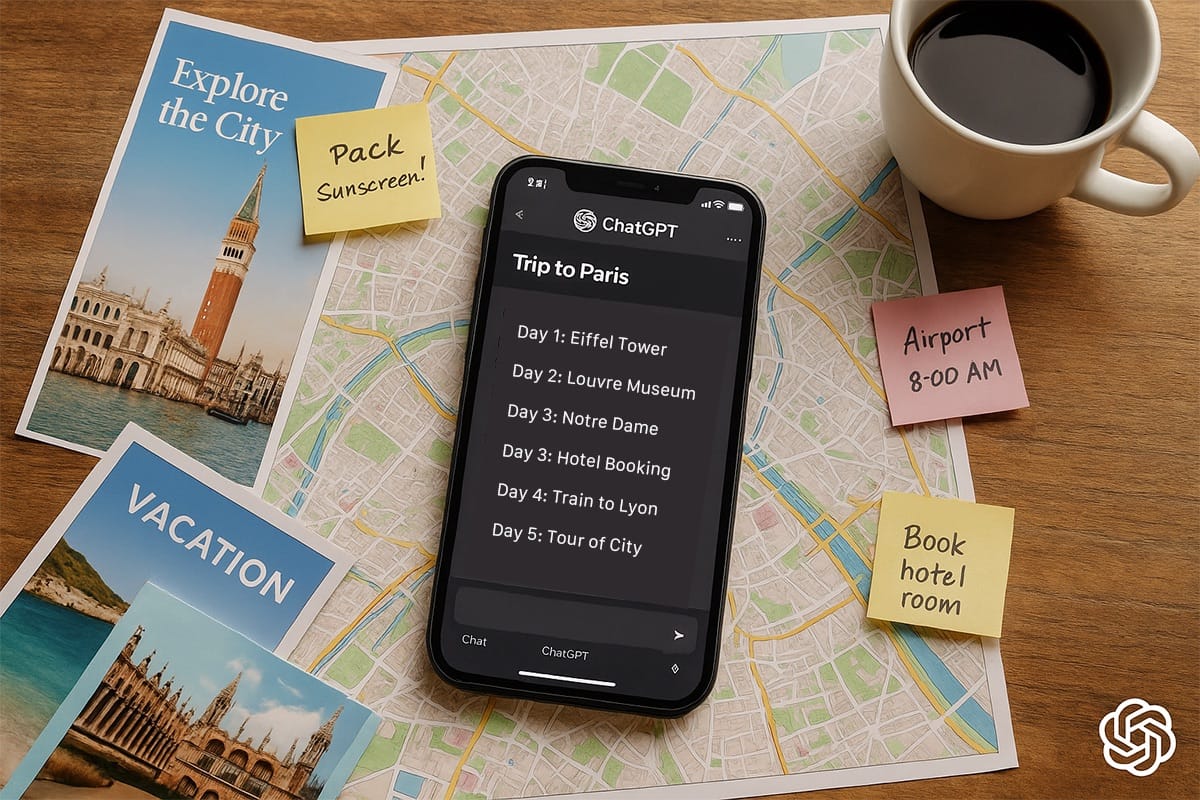How I Use ChatGPT to Plan Trips, Find Budget Stays, and Save Money While Traveling

In 2025, traveling feels easier than ever — and a big reason for that is ChatGPT. It’s not just a chatbot anymore. For me (and a lot of other travelers), it’s become a real travel buddy. I use it to save money, plan better itineraries, and avoid mistakes I definitely would’ve made a few years ago.
Here’s how I personally use it on my trips — plus a few things I’ve learned along the way.
Itinerary Planning: From “Where Should I Go?” to “What Should I Do?”
Whenever I want to explore a new place, I literally just ask:
“Give me a 7-day itinerary for southern Spain with a budget under $100/day.”
What I get back is a daily plan with cities, food tips, transport, even hidden spots I’d probably never find in a guidebook.
💡 Pro tip: the more details you add, the better the plan. I often throw in things like “vegetarian-friendly” or “no overnight buses.”
Finding Budget-Friendly Accommodation
ChatGPT doesn’t book hotels, but it’s amazing for cutting down research time. For example:
“Best hostels in Lisbon for digital nomads with fast Wi-Fi and under $25/night.”
It gives me neighborhoods, pros and cons, average prices. So when I finally open Booking or Hostelworld, I already know what I’m looking for.
Price Comparisons That Save Me Mistakes
Simple questions like:
- “Is it cheaper to take a train or bus from Rome to Florence?”
- “Is a Eurail Pass worth it for 10 days?”
It usually gives a side-by-side breakdown, including fees or hidden costs. Honestly, this alone has saved me from wasting money more than once.
Local Advice On the Go
When I land in a new place, I often use ChatGPT for small but useful things:
- “3 vegetarian restaurants near Porta Garibaldi in Milan under €15.”
- “How do I ask for a SIM card in Turkish?”
It’s faster than scrolling endless reviews, and if you’re using GPT with live internet, it can even pull up events or transport updates.
Budget Forecasting Before I Go
Before a trip, I’ll ask something like:
“What’s a realistic daily budget for Vietnam, staying in guesthouses and eating street food?”
It spits out numbers for food, transport, SIM cards, etc. I usually check them against blogs, but it’s way more up-to-date than old posts from 2019.
Crisis Mode
This is where it really shines.
- Lost baggage at Istanbul Airport → got a step-by-step guide on what to do.
- Visa extension in Thailand → clear process with links.
- Canceled flight in Europe → my exact rights under EU law.
It doesn’t replace staff at the airport, but having the info in my pocket keeps me calm.
Packing Lists & Quick PDFs
I once asked: “Packing list for Iceland in March, solo trip.”
I got a full, weather-specific list that I saved as a PDF. No more overpacking sweaters I don’t need.
Real Time & Money Saved
On average:
- I save 3–5 hours of planning per trip.
- Around $100–200 by choosing smarter SIM cards, routes, and places to stay.
- And fewer dumb mistakes (like overpaying for taxis).
Local Etiquette & Safety
This one matters more than people realize.
- Dress codes for mosques in the UAE.
- What not to do in Thai temples.
- Pickpocket hotspots in Barcelona.
Sometimes it feels like having a friend who reminds you not to do something embarrassing (or unsafe).
What AI Still Can’t Do
It’s not perfect:
- It can’t give the “feel” of a place — that’s still up to you.
- Sometimes info is slightly outdated, so I double-check anything important.
- Works best in English.
✨ New Ways I’ve Been Using It
- Translation buddy: I ask it to rewrite my Airbnb message in Spanish or French so I don’t sound like Google Translate.
- Food adventures: I ask for “5 street foods I should try in Bangkok and how to order them like a local.”
- Photography tips: Before visiting a landmark, I ask “Where’s the best angle for photos of X?” and often get surprisingly useful answers.

Final Thoughts
For me, ChatGPT has quietly replaced travel agents, random forums, and even Google Maps in many situations. It doesn’t kill the joy of travel — it just removes the stress.
With it, I travel smarter, cheaper, and more confidently. And while AI will never replace the feeling of discovery, it makes the path to those discoveries a lot smoother.



